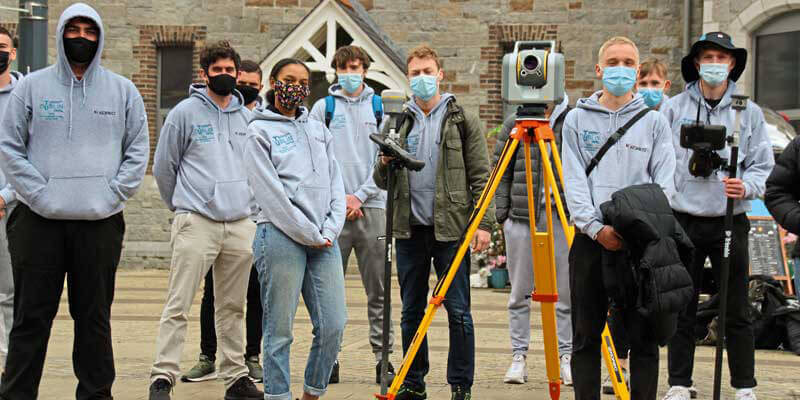Mark Poveda ponders the question of how best to stimulate a new generation of geospatial professionals

Virtual Reality, 3D Laser scanning, robotics, AI, Reality data capture, data analytics …. today’s careers in geospatial offer numerous possibilities and are a perfect fit for the tech-savvy, early adopters of Generation Z. These motivated individuals seek a career path that allows them to evolve, to use technology in an exciting and gratifying way, and to stay relevant throughout their working life. What better match than a career in geospatial!
Along with three of my KOREC colleagues, I recently revisited my old college, the Technical University of Dublin. The aim of the day was to introduce 1st and 2nd year students to some of the very latest geospatial technology we have available. I found the students responsive and tuned-in to the opportunities awaiting them. However, like many universities across the UK and Ireland, numbers for the TU Dublin Geospatial/Surveying courses are down, and that presents a major problem for our industry. It’s easy to see from the number of vacancies being advertised that we are suffering a shortage of skilled geospatial professionals, while setting-out engineers are increasingly hard to find.
But why is this and what can we do about it?
Adapting to change
Although institutions such as TU Dublin are working hard to make their courses attractive to future intakes – e.g., revised modules that reflect industry changes, apprenticeship-style learning that combines an academic qualification with practical work experience, and a greater emphasis on technology –numbers continue to decline. Having talked to students about these issues, here are some points that came up:
We’ve come a long way from the days of nothing but muddy boots and making maps, and while this still remains attractive to some, our messaging must reflect what a new generation of geospatial professionals expects. It is a profession that will undoubtedly remain relevant because spatial data is everywhere and in everything we do, from using Google Maps to creating smart cities. In 2020 the UK gaming market was valued at around £7bn, while a 2018 conservative estimate of the UK geospatial industry valued it at over £6 billion. And let’s not forget that it is continuing to expand at a rate of knots!
Our industry also offers cutting-edge technology. Mobile mapping is used to survey F1 racing circuits around the world; Augmented Reality systems such as Trimble’s SiteVision bring data to life in visualising and exploring complex information with unrivalled accuracy; drones are now commonplace in the surveyor’s portfolio, and a vast amount of 3D data is used and required in the gaming industry.
Spreading the message
It’s vital that we communicate this forward-looking message, and that our universities and colleges have the opportunity to expose their students to the technology on offer .… and this is where the suppliers of goods and services have a role to play. We would urge colleges to get in touch with them to learn about educational discount schemes available, such as those from KOREC and Trimble.
We have a great message to spread and we need to do it through social media and the channels favoured by those of a younger age group, starting with 15 or 16 year-olds. Maybe school geography syllabuses can include this topic; field days arranged around measurement; downloadable apps created based on positioning and, of course, industry representation at school careers fairs.
I know that there are no easy solutions and that promoting our fantastic industry is a long-term project, but I believe that it’s vital to start thinking about how we connect the dots between a motivated tech-savvy, ambitious younger generation, and an industry that can tick every box.
Mark Poveda is Group Commercial Director of KOREC Group (www.korecgroup.com)


